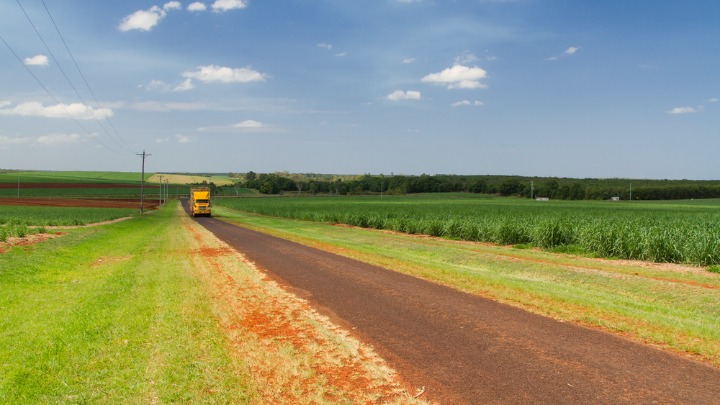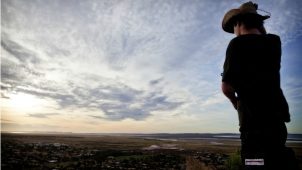The shearer philosophers in Blackall

You come into Blackall, a little Western Queensland town about 1000 km – or ten hours or so if you stay in the speed limit – from Brisbane, along the Matilda Highway. There’s a fair chance of passing more grey nomads in their Winnebagos than dead kangaroos. Although it’s a close call because the road kill is huge in numbers this year, but then again, so are the grey nomads.
It’s a Saturday afternoon and the main drag of Blackall is like that of every small Australian country town – quiet and deserted. This place, population about 1,600, is oaked with history. It is where the fledgling Australian Labor Party’s constitution and rules were signed off; where Jackie Howe set a world sheep shearing record and where the Black Stump became part of history.
I had read about Jackie Howe and the Barcoo River as a kid – in the days before we had television – by the yellowish light of the old kerosene lamps. It was a country so different and so far from Victoria as to be a place for dreaming. They were places as unreachable, as untouchable and mysterious as Paris or Rome. It had been a long journey from the dryness of the wheat, sheep and dust country.
 But now, standing in the deserted main street of Blackall, on a hot Saturday afternoon, feeling the heat bounce off the bitumen and concrete and marvelling how much this small Western Queensland town felt like every other small regional town, I felt an affinity with Jackie Howe.
But now, standing in the deserted main street of Blackall, on a hot Saturday afternoon, feeling the heat bounce off the bitumen and concrete and marvelling how much this small Western Queensland town felt like every other small regional town, I felt an affinity with Jackie Howe.
My old man had been a shearer and at various times in my life I had worked as a roustabout in local sheds. I remember them as large hot places, made of corrugated iron with big wooden wool presses. These are workplaces where men had names like ‘darkie’ (a reference to hair colour at a time when the world was less sensitive) ‘sailor’ (for unknown reasons) and ‘bomber’, a small wiry man with a hand-rolled cigarette glued to the corner of his mouth that constantly bounced as he talked. They were places of stories and yarns, fights and grog, mateship and respect.
In this place you were surrounded by the clatter of the shearing machines; the bleating of the sheep and the blueness of language. You learnt a lot, watching and listening to these men, leaning on a broom waiting to dart in and sweep away the bits and pieces chewed off by the machines. They were dressed in navy Jackie Howe singlets, long before they become fashionable, denim trousers marked by the lanolin from the wool, and with lines of sweat that ran down their face and off their nose.
The sheep, slow and stubborn with age and heavy with fleece, resented and resisted what was coming. Bastard, old bastard, hard bastard were words that bounced up and down the floorboards. You watched them flicking the shorn sheep down the chute with skill, pushing open the pen gates, grabbing another, keeping the rhythm going. One sheep shorn every three or four minutes; the running tally on the board so you knew how many you had and how many the bloke next to you had. It’s a quiet competition with the older blokes – for the younger men – it is a measurement of their testosterone levels – like young bulls flexing their muscles.
In between sheep, you dart in with the broom to sweep away the bits and pieces, keeping the board clean. Later, you would graduate to picking up the fleece, and flinging it, with some skill and great pride, down the skirting table where it was graded, rolled, stored. Shearing was hard work but that’s what defined these men. They were not defined by their education or trades skills but by their capacity to absorb hard, unremitting, back-breaking work. They lumped heavy bags of grain on their shoulders; they cut trees with axes, hammers and wedges; they sheared sheep, dug ditches, sweated in the heat and battled day in and day out.
In their world, real workers could work hard and drink hard. It defined your maleness – it made you an Australian Man. (“He’s a hard worker,” said with pride, “and can he hold his grog,” said with just as much pride).
They often had a simplified view of the political landscape – Labor was for the working man – and the Liberals for the bosses. Neat and clean. The definition spilled over into your choice of pubs – some were workers’ pubs, others for the bosses, bank workers, and teachers. Simple, clean – no swinging voters, no independents – just us and them; when trust in public institutions was a substitute for political activity.
But shearing sheds were places of manners – ducks on the water meant a women in the shed and heaven forbid he who swore while she was around. It was an unusual, social democratic place where all were equal with the boss. Surrounded by this, you grew up thinking that the great Australian egalitarianism actually meant something – and it did until your first experience of being told to go to the back door to pick up the morning tea and realising there was a social demarcation line that you did not cross. Little things dictated where you fell on the social and professional ladder. Shearers didn’t rate too highly – nor did the sons of shearers.
But you learnt from them, these shearer philosophers – you learnt a code of decency and fairness – doing what was right was not to be marvelled at – merely expected. And you met men who seem to have fallen off the escalator – for whatever reasons – and who had a predilection for the metho as they picked up a couple of days work here and there
They were colourful and interesting, generous with their time and opinions and later, when you were progressing through the educational system, generous with their support and encouragement. I suspect that the profession, like others has become sanitised, beaten into a blandness. I know, watching the old man sweat and strain for eight hours day in day out, week in week out, convinced me I would never be a shearer, would never rely the strength of my back for a living.
I was in Blackall for the weekend, on my way to somewhere on a road that stretched like a taught line connecting two impossible horizons. I went to the Barcoo Hotel for lunch – Chicken Parmigiana – like every country pub – and a couple of beers – enjoying the retreat from the heat. But the ringing and clanging of the pokies intrudes and sent me back to my motel room. It’s like every other motel room throughout Australia – and you lie on the bed thinking about Darkie, and Sailor and Marshall and wonder what happened to them all while I mark off the tourist delights – the Black Stump; the Jack Howe Memorial Statue; the old Wool Scour And I wonder what the old man would have made of all this.
To write for Starts at 60 and potentially win a $20 voucher, send your articles to our Community Editor here.









 Proudly Australian owned and operated
Proudly Australian owned and operated